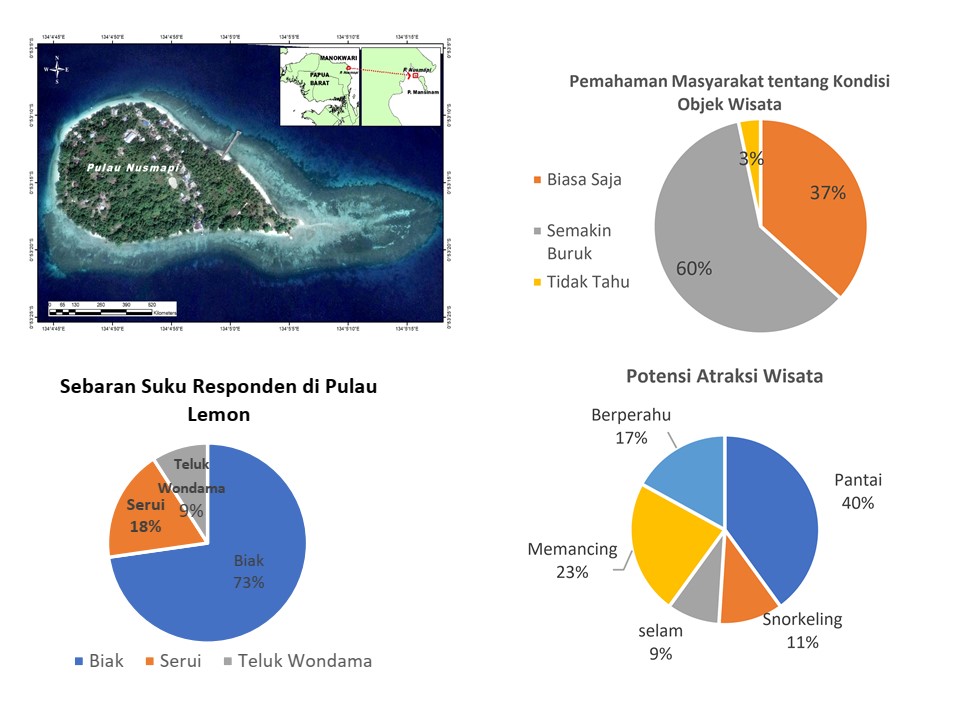Relationship between Perception and Socio-Economic Characteristics of Culture Community in the Development of Marine Ecotourism in Nusmapi Island
DOI:
https://doi.org/10.46252/jsai-fpik-unipa.2021.Vol.5.No.4.181Keywords:
Nusmapi, marine tourism, perception, socio economic, cultureAbstract
Marine tourism is a type of special interest tourism, namely by managing and utilizing marine and coastal landscapes, both those that are managed directly such as swimming, boating, snorkeling, diving, or indirectly such as picnics and beach sports. Nusmapi Island has the potential to be developed as a marine tourism object which has the potential for waters and coral reefs that are in good condition. The purpose of this study was to determine the relationship between the level of public perception and the socio-economic conditions of the local community on Nusmapi Island. In October-November 2020 this research was carried out on Nusmapi Island, Manokwari Regency. The descriptive exploratory method is by conducting a survey to the research location. The data collected were analyzed descriptively by tabulating and displayed in the form of pictures, tables, and graphs to provide an explanation of the information obtained in this study. The relationship between the level of perception and socio-economic and cultural aspects of society was analyzed by multiple regression. The variables of age, gender, education, main occupation, and additional work were positively correlated with community perception, while length of stay and ethnic origin were negatively correlated with perceived level. The correlation value between the 7 independent variables (X1-X7) and the dependent variable (Y) is 0.839 which is included in the very strong category. The value of the coefficient of determination 61% explains the variables in the resulting regression model, the remaining 39% is influenced by other factors outside the model. Age is a significant social variable on people's perceptions of the development of marine tourism on Nusmapi Island. The community as the main component in development has an important role in developing local potential that comes from nature, socio-culture or improving the community's economy through the development of marine tourism.
Downloads
References
Anggraeni, D. M. Baiquni. (2013) Persepsi Wisatawan Terhadap Variasi Objek Wisata Di Pantai Glagah Kulonprogo. Jurnal Bumi Indonesia, 2(4):1-8. http://lib.geo.ugm.ac.id/ojs/index.php/jbi/article/view/562
Baiquni, M. (2011). Pengembangan Produk Pariwisata Alternatif di Provinsi Daerah Istimewa Yogyakarta dan Sekitarnya. Yogyakarta: Pusat Studi Pariwisata UGM
Garnadi, D. (2004). Pengetahuan, sikap, dan tindakan masyarakat sekitar hutan terhadap hutan (Kasus di Hutan Pendidikan dan Pelatihan Kehutanan Kadipaten, Kabuaten Majalengka). (Tesis). Bogor: Institut Pertanian Bogor.
Ihalauw Y.F, V.H.Makarau, F.Warouw. (2016). Nilai –Nilai Kearifan Lokal Dalam Permukiman Numfor Doreri Di Pulau Mansinam. https://ejournal.unsrat.ac.id.
Kartono K, Gulo D. (2000). Kamus Psikologi. Bandung (ID): CV Pionir Jay
Masria, Golar, & Ihsan, M. (2015). Persepsi dan sikap masyarakat lokal terhadap hutan di Desa Labuan Toposo Kecamatan Kabuan Kabupaten Donggala. Warta Rimba, 3(2), 57–64.
Mayangsari, D., Muin, S., & Siahan, S. (2017). Persepsi Masyarakat Terhadap Keberadaan Objek Ekowisata Mangrove Di Desa Pasir Kecamatan Mempawah Hilir Kabupaten Mempawah. Jurnal Hutan Lestari, 5(3), 668– 679.
Normina (2016). Partisipasi Masyarakat dalam Pendidikan. Ittihad Jurnal Kopertais Wilayah XI Kalimantan Volume 14 No.26 Oktober 2016
Nurisyah, S. (1998). Rencana pengembangan Fisik Kawasan Wisata Bahari di Wilayah Pesisir Indonesia. Bulletin Taman dan Lanskap Indonesia. Perencanaan, Perancangan dan Pengelolaan. Volume 3, Nomor 2, 2000
Nursalam dan Pariani, S. (2001). Pendekatan Praktis Metodologi Riset Keperawatan. Jakarta: Salemba Medika.
Pattiasina, T. F. (2018). Analisis Strategi Pengelolaan Ekosistem Terumbu Karang Berbasis Resiliensi: Studi Kasus di Teluk Doreri, Kabupaten Manokwari. Disertasi Program Doktor Ilmu Perikanan dan Kelautan, Program Pascasarjana Fakultas Perikanan dan Ilmu Kelautan Universitas Brawijaya, Malang. 291 hal.
Pattipeilohy W., Pattiasina, T., Leatemia, S dan Talakua, S. (2020). Struktur Komunitas Ikan pada Hamparan Lamun di Perairan Teluk Doreri Kabupaten Manokwari. Jurnal Perikanan dan Kelautan Musamus. 3,1 (Oktober 2020), 17-29.
Putera, A.H.F., Fachrudin, A., Niken, T.M.P., dan Setyo, B.S., (2012). Kajian Keberlanjutan Pengelolaan Wisata Pantai di Pantai Pasir Putih Bira, Bulukumba, Sulawesi Selatan. Jurnal Penelitian dan Pengembangan Kepariwisataan Indonesia. 8(3):241–254.
Robins, T. (2007). Pengantar Psikologi Umum. Universitas Sumatera Utara
Shambodo, Y. (2020). Faktor Yang Mempengaruhi Persepsi Khalayak Mahasiswa Pendatang UGM Terhadap Siaran Pawartos Ngayogyakarta Jogja TV. Jurnal Al Azhar Indonesia Seri Ilmu Sosial Vol.1, No. 2, Agustus 2020.
Siringo, M., & Adikampana, I. M. (2014). Persepsi Wisatawan Terhadap Kemacetan Di Jalan Pantai Kuta Kabupaten Badung Bali. Jurnal Destinasi Pariwisata, 2(1), 24–35.
Sudjana. (1994). Metoda Statistika. Bandung: Tarsito
Sugiyono, (2001). Metode Penelitian, Bandung: CV Alfa Beta.
Sutomo. A, M, Susilo. Lies, S. (1999). Analisis Pengangguran Tenaga Kerja Terdidik di Kotamadya Surakarta (Pendekatan Search Theory). Edisi Januari-Maret 1999. Perspektif: FE UNS.
Umar. (2009). Persepsi dan perilaku masyarakat dalam pelestarian fungsi hutan sebagai daerah resapan air (Studi kasus Hutan Penggaron Kabupaten Semarang) (Tesis). Semarang: Universitas Diponegoro.
Yulianda F. (2007). Ekowisata Bahari sebagai Alternatif Pemanfaatan Sumberdaya Pesisir Berbasis Konservasi. Makalah Seminar Sains pada Departemen Manajemen Sumberdaya Perairan. Fakultas Perikanan dan Ilmu Kelautan IPB.Bogor
Yuliara, I, M. (2016). Modul Regresi Linear Berganda. Jurusan Fisika. Fakultas Matematika Dan Ilmu Pengetahuan Alam. Universitas Udayana


















